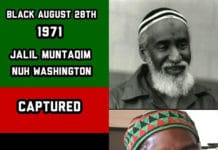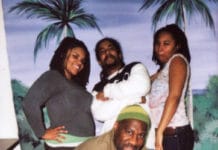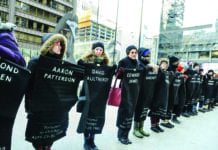by Jalil Muntaqim
Since the publication of Michelle Alexander’s excellent “The New Jim Crow: Mass Incarceration in the Age of Colorblindness,” the issue of prison and parole reform has been raised as far as Obama’s White House. In the national debate ensuing from Michelle Alexander’s book, some have not given credit to Angela Davis forging national interest in prison abolition with her organizing Critical Resistance campaigns across the country. With the nominal success of the Pelican Bay prisoners’ hunger strike in California, we recognize that when we organize a national determination, we can collectively force institutional change.

With the advent of the Black Lives Matter (BLM) movement, there is a new generation of activists who have included a challenge to mass incarceration as part of their national debate and agenda for institutional change. However, it is extremely important that BLM and other prison and parole reform advocates have a profound historical foundation in their understanding of the prison industrial complex. In my recent book, “Escaping the Prism: Fade to Black,” I included an essay, “The 13th Amendment – Prison Slavery and Mass Incarceration,” hoping to offer more insight on how to formulate talking points to persuade others, particularly faith-based communities, to join and advocate for change.
This struggle is not new to me; in fact, my frustration is that it is often necessary to repeat and reiterate the need for a national determination that actually challenges the very foundation of the institution of prison slavery. In this regard, I am offering a legal argument that two other former prisoners and I prepared and fought in the U.S. District Court for the Southern District of New York (up to the U.S. Supreme Court and including petitioning the United Nations), stating the “exception clause” in the 13th Amendment to the U.S. Constitution is in violation of international law and U.S. treaties with the United Nations and the international community.
On Nov. 19, 1979, I and two other former prisoners filed a civil rights complaint in the U.S. District Court for the Southern District of New York alleging that the 13th Amendment to the U.S. Constitution is in violation of international law and general principles of human rights. The complaint was docketed as 79 CIV 6228 and sent to federal Judge Pierce for consideration. Copies of the complaint were sent to various legal groups and organizations, such as the NAACP Legal Defense Fund, American Civil Liberties Union etc., in an effort to win their support for the petition.
With the nominal success of the Pelican Bay prisoners’ hunger strike in California, we recognize that when we organize a national determination, we can collectively force institutional change.
Unfortunately, they declined to respond to our overtures to support this case by providing legal representation. As novice pro se litigants, we pursued the complaint to the best of our abilities, ultimately being denied certiorari by the U.S. Supreme Court. We then sought to win the attention of United Nations subcommittees, to no avail.
It was obvious to us then, as it should be to activists today that, without a serious national organizational determination, it was improbable for us to win. However, we were adherent to the principle of Frederick Douglass that “power concedes nothing without a demand; it never has and it never will,” and our audacious attitude was what we needed to challenge the system of prison slavery, no matter how implausible the possibility of success.

In 2016, it is believed that the potential exists to build the kind of national and international campaign to demand the 13th Amendment be amended to excise and omit the clause that permits involuntary servitude and slavery of prisoners. Therefore, I am posting the Memorandum of Law that we prepared in 1979, as I believe it provides today’s activists and advocates of prison and parole reform both a historical and legal foundation to build a substantial movement to once and for all end all forms of involuntary servitude and slavery in the United States.
To download the Memorandum of Law, click here. (For those without internet access, the Bay View will print and mail the 30-page memorandum to you on request.)
It is my sincere hope this document will be widely read and studied, especially by law students, professors and legal groups involved and associated with prison and parole reform advocacy. My aspiration is to offer the overall movement broader talking points to persuade and evolve an informed national campaign capable of organizing a durable prison slavery abolition movement.
Certainly, the Black Lives Matter movement, Critical Resistance, Jericho Amnesty Movement etc., can achieve more in the educational agit-propaganda determinations with this information as part of their pamphlets, brochures and other outreach materials, including social media posting.
My aspiration is to offer the overall movement broader talking points to persuade and evolve an informed national campaign capable of organizing a durable prison slavery abolition movement.
I firmly believe there cannot be any significant discussion about prison and parole reform absent a challenge to the very foundation of the prison slave system. The economic and racial implications of prison involuntary servitude and slavery are based on the historical reality of African chattel slavery. Who can deny that the slavery abolition battles that resulted in the Emancipation Proclamation and the 13th Amendment were incomplete and are unfinished business?
Remember: We are our own liberators!
Jalil A. Muntaqim
Political prisoner and prison movement leader Jalil Muntaqim denied parole for the ninth time
Dear family, friends and supporters:
As many of you have learned, I was interviewed on June 21, 2016, by the parole board for the ninth time. On June 27, 2016, I received their decision (below) denying my release, basically reiterating all that has been said the previous eight times I was denied parole.

The denial is based primarily on the “nature of the crime” and “criminal history” – something that will never change. Reading this denial, we can see they doubled down on attempting to characterize me as an unremorseful “cop killer,” absent any evidence to support their position after 44 years of imprisonment.
As previously mentioned, Edward Sharkey, one of the parole commissioners who conducted this hearing, was the same parole commissioner who conducted the hearing in 2012 and was on the panel denying parole in 2014. This 2016 parole hearing is the third consecutive time he was present on the panel and voted to deny release.
Although in 2014 one commissioner voted for my release, notably an African-American woman, this time all three commissioners denied my release. Significantly, one of the commissioners, Ellen Alexander, was on the March 2016 panel of my co-defendant Herman Bell and denied his release on parole.
It has become ever more apparent that a fair and impartial parole hearing is not possible, despite 44 years of having done everything necessary to be granted parole.
For example, in the parole hearing of 2014, one of the commissioners raised that I received a disciplinary report in 2013 (for having two stamps on my way to the library), and that the COMPAS Risk Assessment reported “Prison Misconduct – High.” The 2014 parole decision denying release stated in part: “You have multiple prior disciplinary violations during this term and your risk because of prison misconduct is scored as ‘HIGH’ … You need to improve your behavior to demonstrate the ability to comply with rules, which will be necessary when in the community.”
However, the 2014 COMPAS Risk Assessment reports: “Prison Misconduct – Low,” having demonstrated the correction of the previous report and behavior. Furthermore, previous assessments of 2014 read: Risk of Felony Violence 2 Low; Arrest Risk 2 Low; Abscond Risk 4 Low.
It has become ever more apparent that a fair and impartial parole hearing is not possible, despite 44 years of having done everything necessary to be granted parole.
The 2016 COMPAS Risk Assessment reads in these same areas: Risk of Felony Violence 1 Low; Arrest Risk 1 Low; Abscond Risk 1 Low. Therefore, I not only addressed and lowered the Prison Misconduct issue used to deny release in 2014; all other concerns which were low in 2014 are lower in 2016.
In essence, there is no risk of felony violence, arrest risk, abscond risk, and prison misconduct as a reason to deny release. So, what did they rely on to deny release? History of Violence – a history that is subject to the history and nature of the crime from 1971, 45 years ago when I was originally arrested. Something that will never change!

Given the fact that I am unable to obtain a fair and impartial parole hearing, I am urging family, friends and supporters to initiate a national campaign directed to New York Gov. Andrew Cuomo, persuading him to grant “commutation of sentence to time served.” Gov. Cuomo has the authority to commute this 25-to-life sentence to time served, giving consideration to all that I have accomplished in 45 years of imprisonment, the degree of family and community support, and the fact that the original sentence has for all intents and purposes been served.
I am asking everyone who recognizes the New York State Parole Board is biased as a law enforcement agency in cahoots with the PBA’s opposition to my release, to initiate a national campaign calling and writing to Gov. Andrew Cuomo, urging that he commute my sentence to time served.
In closing, I need to extend my gratitude to all those who wrote letters and signed petitions in support of my release on parole. It has been your support that has strengthened my resolve and kept me determined to continue to fight for freedom.
Over the years, we have witnessed the release of Marshall Eddie Conway, Albert Woodfox and Sekou Odinga, all of which leads to the reality that, with a solid tenacious determination, we can win over the injustice of repression. This is extremely upsetting to me and my family, especially when knowing there is absolutely nothing I can do alone, having already done everything asked of me by the parole board, to persuade them to grant parole.
Therefore, we need to up the ante in our demand for fair and impartial parole hearings by putting the onus for change in parole and my freedom in the hands of New York Gov. Cuomo. Please call and write often demanding commutation of sentence to time served and my immediate release from prison.
Sincerely yours, in struggle,
Jalil Muntaqim
Parole decision: DENIED – HOLD FOR 24 MONTHS, NEXT APPEARANCE DATE; 06/2018
Conditions of Release/Staff Instructions/Reasons for Denial:

After review of the record and interview, the panel has determined that if released at this time, there is a reasonable probability that you would not live and remain at liberty without again violating the law and your release would be incompatible with the welfare of society and would so deprecate the serious nature of the crime as to undermine respect for the law.
The panel has considered your institutional adjustment including discipline and program participation. Required statutory factors have been considered, including your risk to society, rehabilitation efforts and your needs for successful re-entry into the community. Your release plans have also been considered, as well as your COMPAS Risk and Needs Assessment, case plan and sentencing minutes, which are in the file.
Your instant offense, murder (two counts), involved you, acting in concert, shooting and killing two police officers. You admit to firing a weapon during the crime. You have engaged in other unlawful actions which resulted in probation and serving state time in California state prison. You are a multistate offender with offenses committed in California as well as New York.
You do have a juvenile history and conviction in the federal system. Due consideration given to your document submissions, program accomplishments, and letters of support from defense attorney and official sources and program completions. Due consideration was given to packet of National Lawyers Guild.
This panel remains concerned about your history of unlawful and violent conduct, and your COMPAS Risk Assessment is “High” for history of violence. Your conduct could be viewed as an assassination of two unsuspecting police officers who were merely walking toward their car and reflects a disregard for human life.
There is significant community opposition to you release. You also expressed limited remorse for the death of the two police officers who were merely doing their jobs. Accordingly, discretionary release at this time is not warranted. PAROLE IS DENIED.
Parole commissioners conducting the hearing: Edward Sharkey, Ellen Alexander, Marc Coppola

Ancestors roll call! What did they think?
What did they think?
Tamir Rice, Sandra Bland, Akai
Gurley, Trayvon Martin, Michael
Brown, life precious blood spilled
in the mud. FREEDOM …

When will it come?
What did they think?
Eric Garner, Oscar Grant, Sean
Bell, Amadou Diallo whose life
breath echoed the dreams deferred
from Afrikan ancestors through
the Middle Passage, to Denmark
Vesey and Nat Turner, do you
hear it, are you listening?
Micah heard the torturous
mourning echoing over
the ages forcing us to
remember Shaka Zulu, Queen
Nzinga, the Mau Mau to Steve
Biko and Nelson Mandela.
What did they think?
Marcus Garvey, Malcolm X, Medgar
Evers, Huey P. Newton, Fred
Hampton, George Jackson, from
the African Blood Brotherhood,
to the Deacons for Defense,
the Black Panther Party and
the Black Liberation Army, a
history of noble resistance.
What did they think?
Mark Essex, Zayd Shakur, Frank
Fields, Twyman Meyers, Anthony
“Kimu” White did not forget
Harriet Tubman, Sojourner Truth
or Rosa Parks, reminiscent of the
fugitive slave laws, Black Codes
and Jim Crow, while Martin L.
King Jr., revered by all except
J. Edgar Hoover and James Earl Ray.

What did they think?
Freddy Gray, Antwon Shumpert,
Alton Sterling, Philando Castile
Let’s not forget Chicago teenager
McDonald, 17 hot bullets spun
him like a drunken ballerina,
with Blue arrogance and hubris,
all around the world the same
song. Yet, they call the oppressed
terrorists when they fight back.
What did they think?
Yes, suffering is universal, it knows
no color, race, ethnicity, class or
status. No, they are not immune
to pain and loss, it does not
discriminate, despite their belief
in white supremacy. The racial
divide cannot hide the common
blood inside us all, flowing scarlet
red life, they dismiss by the white
heat of hate.
What did they think?
After 430 years of racial strife
and mass incarceration, the 13th
Amendment, a violation of international
law, in America – slavery still exists!
What did they think?
Time will absolve the evil within.
But we know time absolves nothing
without sacrifice. So, they trot
out apologetic House Negroes,
talking heads lacking historical
facts, to track the racial divide
that leads to the loss of Black
lives.
Micah destroyed the myth of Tarzan,
Captain America and Superman.

What did he think?
That Black Lives Mattered?
They have demeaned you and call
you demented, saying you’re
delusional and insane; but didn’t
they say the same about Nat Turner
and Nelson Mandela? Aren’t we all
a product of our environment? So,
isn’t suffering a racist environment
demented and insane? They called
the Panthers terrorists when they
fed our children with one hand
and fought Cointelpro with the
other. When Black people fight
back, they automatically become
crazy; when Black people stand up,
demand justice, they are called
extremist.
What did they think?
White supremacy in all of its subtle
and overt manifestations must prevail
to dispel Black Lives Matter. They
have to blow up this idea, Micah,
like the bomb on MOVE, and the
bomb on the L.A. office of the
BPP. But Chairman Fred said, you
can kill a revolutionary, but you
can’t kill the revolution. You can
imprison a freedom fighter but you
can’t imprison freedom.
What did they think?
We do not celebrate the loss of
life, we mourn as you mourn, we
lament as you lament. We salute
and honor the brave and courageous
whose ultimate sacrifice demands
recognition. It is our collective
shame, we meet at this crossroad, on
the divide of class and race. Yet,
the slow pace for healing is revealing,
our continuing to live a lie, that
Blue blood is more precious than
Black blood.

What did they think?
I urge you to read, to understand
my sensitivity to the matters at
hand, “Hands Up Don’t Shoot,” “When
Police Die,” “A Mother’s Loss,”
expressing our collective anguish
of a seemingly unrelenting war.
We need not keep score, death
is death, and we should not rest
until hate and racism are cast into
the abyss, BY ANY MEANS NECESSARY!
Remember: We are our own liberators!
Jalil A. Muntaqim
Send our brother some love and light: Anthony J. Bottom, 77A4283, Attica CF, P.O. Box 149, Attica, NY 14011-0149. If you want to help Jalil with commissary, send a postal money order to that address. Visit his website, FreeJalil.com and email him at info@freejalil.com.

 Store
Store










